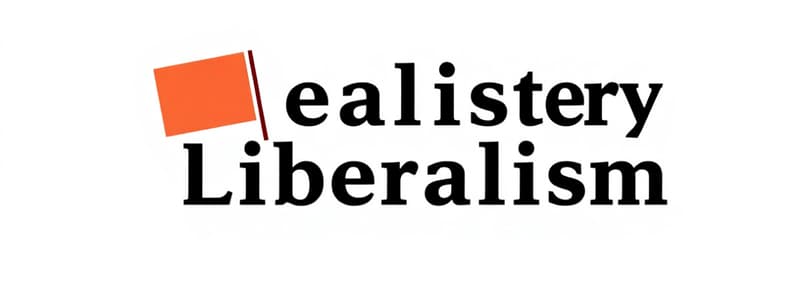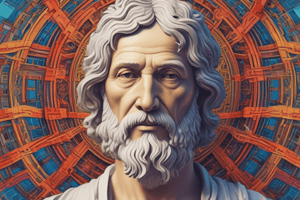Podcast
Questions and Answers
Who emphasized the need for a peaceful social life protected by laws in international relations?
Who emphasized the need for a peaceful social life protected by laws in international relations?
- Immanuel Kant
- Woodrow Wilson
- John Locke
- Hugo Grotius (correct)
What major international organization was established in 1919?
What major international organization was established in 1919?
- United Nations
- League of Nations (correct)
- World Trade Organization
- North Atlantic Treaty Organization
Which theory suggests that wars are more challenging for citizens of Republican states due to their direct impact?
Which theory suggests that wars are more challenging for citizens of Republican states due to their direct impact?
- Collective security
- Institutional liberalism
- Republican liberalism (correct)
- Democratic peace theory
Which philosopher proposed the concept that political authority should protect all individuals' interests?
Which philosopher proposed the concept that political authority should protect all individuals' interests?
What was Woodrow Wilson's notable proposal that aimed to outline principles for peace after World War I?
What was Woodrow Wilson's notable proposal that aimed to outline principles for peace after World War I?
Which of the following thinkers is associated with institutional liberalism?
Which of the following thinkers is associated with institutional liberalism?
What aspect of idealism focuses on ensuring a lasting peace through international organizations?
What aspect of idealism focuses on ensuring a lasting peace through international organizations?
Which of the following years marks the establishment of the United Nations?
Which of the following years marks the establishment of the United Nations?
What significant principle does the liberal tradition in international relations emphasize?
What significant principle does the liberal tradition in international relations emphasize?
What is the main focus of institutional liberalism?
What is the main focus of institutional liberalism?
According to the democratic peace theory, what do democracies tend to avoid?
According to the democratic peace theory, what do democracies tend to avoid?
What did Immanuel Kant suggest regarding liberal democracies?
What did Immanuel Kant suggest regarding liberal democracies?
What characterizes collective security arrangements?
What characterizes collective security arrangements?
Which of the following best describes the goal of international organizations in the context of institutional liberalism?
Which of the following best describes the goal of international organizations in the context of institutional liberalism?
What is a key assertion of republican liberalism?
What is a key assertion of republican liberalism?
What does the term 'international regime' refer to?
What does the term 'international regime' refer to?
What does Russett emphasize regarding political decisions in democracies?
What does Russett emphasize regarding political decisions in democracies?
What factor does Andrew Moravcsik suggest is key in determining political action?
What factor does Andrew Moravcsik suggest is key in determining political action?
Which statement is true regarding the Convention for the Protection of Human Rights and Fundamental Freedoms?
Which statement is true regarding the Convention for the Protection of Human Rights and Fundamental Freedoms?
Who is recognized as a prominent liberal institutionalist scholar focused on environmental treaties?
Who is recognized as a prominent liberal institutionalist scholar focused on environmental treaties?
What was a primary goal in establishing the United Nations following World War II?
What was a primary goal in establishing the United Nations following World War II?
Which of the following is NOT a component of the United Nations system?
Which of the following is NOT a component of the United Nations system?
What does idealism in foreign policy advocate for?
What does idealism in foreign policy advocate for?
Which statement best describes the International Court of Justice?
Which statement best describes the International Court of Justice?
What does the idea of 'doux commerce' suggest regarding trade and war?
What does the idea of 'doux commerce' suggest regarding trade and war?
Which organization was established to ensure collective security after World War I?
Which organization was established to ensure collective security after World War I?
What concept did Woodrow Wilson advocate for in his 14-points speech?
What concept did Woodrow Wilson advocate for in his 14-points speech?
Which of the following was NOT a proposal from idealist thinking mentioned in the creation of the League of Nations?
Which of the following was NOT a proposal from idealist thinking mentioned in the creation of the League of Nations?
Which country did NOT participate in the League of Nations after its establishment?
Which country did NOT participate in the League of Nations after its establishment?
What was one of the main criticisms of the League of Nations during its operation?
What was one of the main criticisms of the League of Nations during its operation?
What does Democratic Peace theory suggest about the conflict patterns of states?
What does Democratic Peace theory suggest about the conflict patterns of states?
Which of the following correctly reflects the changing perception of idealism after World War II?
Which of the following correctly reflects the changing perception of idealism after World War II?
Flashcards
Doux Commerce
Doux Commerce
The idea that increased trade leads to more peaceful relations between nations because war becomes more costly.
Idealism
Idealism
A philosophical perspective believing in human goodness and reason, emphasizing progress and the possibility of improving the world.
Anarchy in International Relations
Anarchy in International Relations
The absence of a central authority or governing body in international relations.
War as an Anomaly
War as an Anomaly
Signup and view all the flashcards
League of Nations
League of Nations
Signup and view all the flashcards
Democratic Peace Theory
Democratic Peace Theory
Signup and view all the flashcards
Woodrow Wilson
Woodrow Wilson
Signup and view all the flashcards
Alfred Zimmern
Alfred Zimmern
Signup and view all the flashcards
Collective Security
Collective Security
Signup and view all the flashcards
International Regime
International Regime
Signup and view all the flashcards
International Organisation
International Organisation
Signup and view all the flashcards
Institutional Liberalism
Institutional Liberalism
Signup and view all the flashcards
Republican Liberalism
Republican Liberalism
Signup and view all the flashcards
Idealist Project
Idealist Project
Signup and view all the flashcards
Idealism in Foreign Policy
Idealism in Foreign Policy
Signup and view all the flashcards
Oran Young
Oran Young
Signup and view all the flashcards
Thomas Weiss
Thomas Weiss
Signup and view all the flashcards
United Nations (UN)
United Nations (UN)
Signup and view all the flashcards
International Regime Building
International Regime Building
Signup and view all the flashcards
Liberalism in IR
Liberalism in IR
Signup and view all the flashcards
Study Notes
Idealist Theory and Liberalism in International Relations
- Idealist theory emerged after World War I, motivated by a desire to prevent future conflicts.
- Leading figures include Alfred Zimmern, Immanuel Kant, Woodrow Wilson, Hugo Grotius, and John Locke.
- Concepts central to idealism include international organizations (e.g., League of Nations, United Nations), international regimes, idealism/utopianism, liberalism, democratic peace theory, and collective security.
- Key dates include 1918 (Woodrow Wilson's 14 points), 1919 (creation of the League of Nations), and 1945 (creation of the United Nations).
- Idealists aimed to end World War I and prevent future conflicts through philosophical approaches and the League of Nations.
- Key trends within liberalism include republican liberalism and institutional liberalism.
- The idealist approach emphasizes a belief in the perfectibility of humanity and optimism for progress.
- Idealists believed that war is not inevitable and that states can create international institutions to promote peace.
Leading Figures
- Alfred Zimmern
- Immanuel Kant
- Woodrow Wilson
- Hugo Grotius
- John Locke
- Montesquieu
- Andrew Moravcsik
- Thomas Weiss
- Oran Young
- Michael Doyle
- Bruce Russett
Concepts
- International organization
- International regime
- League of Nations
- United Nations
- Idealism/utopianism
- Liberalism
- Democratic peace theory
- Collective security
Important Dates
- 1918: Woodrow Wilson's 14 points
- 1919: Creation of the League of Nations
- 1945: Creation of the United Nations
Improving the World: The Idealist Project
- Ending World War I: Utilizing philosophy
- Collective security project: League of Nations
- Two trends: Republican liberalism and Institutional liberalism
Idealist Approach Origins
- Motivated by World War I's trauma, idealist thinkers dedicated their study to war and peace with the goal of ensuring triumph over the conflict.
International Relations via Former Philosophers
- Idealists draw on the work of previous philosophers to develop their theories.
- For instance, Hugo Grotius highlighted the need for international law to maintain peace.
- John Locke advocated for a political authority to secure individual interests.
- Immanuel Kant proposed ideas towards a perpetual state of peace.
Optimism and Trust
- Idealists have faith in human reason and the possibility of progress.
- They believe that war can be avoided through the creation of institutions and cooperation between nations.
Realism in Idealism's View
- War and Peace: Idealists see war as a state of nature anomaly to correct through international efforts
League of Nations' Failure
- The League of Nations, despite its promise, ultimately failed due to the lack of cooperation among nations; this was especially seen through the actions of countries like Germany, Japan and Italy, which contributed to World War II.
Democratic Peace Theory
- A demonstration of republican liberalism
- States with democracies have low conflict rate with other democracies.
Studying That Suits You
Use AI to generate personalized quizzes and flashcards to suit your learning preferences.




